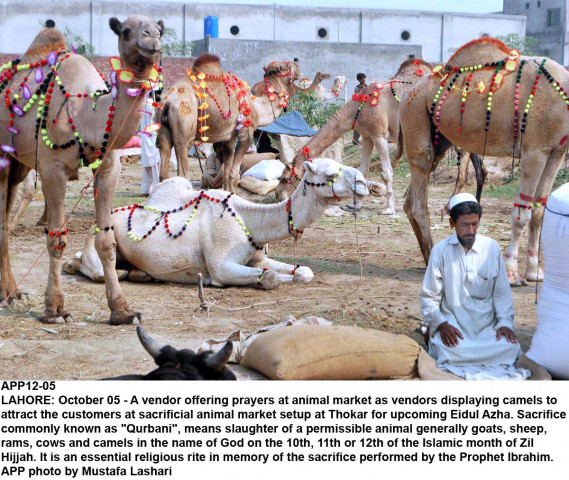On this Eid
Pakistan is an ailing state, and the necessary medicines are going to be hard to swallow but swallow them we must


Pakistan, on this Eid, is passing through a troubled time. Over a million people have been displaced by Operation Zarb-e-Azb, forced out of their ancestral homes and lands to live in penury in tented encampments on the lowlands. They will have few animals to sacrifice, and for most, their very livelihoods have disappeared. They have lost not only their material assets but their pride and dignity as well, and if any segment of the population is worthy of both sympathy and generosity, it is those touched by the battle against extremism. Alongside the displaced of Fata, there are the millions who have also lost everything in the floods this year. As with the IDPs, the flood victims have dropped off the news agenda and are no longer featuring in bulletins nationally or internationally. Their losses are no less tragic than those of the IDPs, and Prime Minister Nawaz Sharif last week admitted that Pakistan does not have sufficient internal resources to address the recurrent floods.
Fighting terrorism and natural calamities have touched a significant section of the population and their misery is compounded by the political logjam that has in many ways distracted the government from the pressing business of healing a distressed populace. Despite what some may wish to believe, Pakistan is not in the throes of a revolution, but it is in a period of accelerated evolutionary political change. The demonstrations in Islamabad and other parts of the country may over time coalesce into a catalytic process from which will flow change — but it will not be tomorrow or next week or month, and it may take years to come to fruition.
It is apparent that there is a significant groundswell of public opinion that is deeply dissatisfied with the state of governance and there is a desire for change. We echo that desire and see systemic change as vital to the future development of a thriving — indeed prosperous — Pakistan. But change must come through the exercise of democratic instruments, through electoral processes and outcomes, and the participation of a people who have come to see the political Old Guard as tainted and out of touch with the harsh realities that confront the ordinary citizens of this country.
Change will not be achieved by grandiose and bombastic soapbox politics delivered through a sound system to an adoring crowd. That is not democratic, either in delivery or purpose, and in a country as crippled as Pakistan, evolution has to be the preferred option to revolution and all its attendant chaos. Despite the allegations of electoral fraud and mismanagement, the 2013 election was remarkable in that it was the first largely peaceful transfer of power from one civilian government to another in the history of the nation, a fact often lost in the blizzard of often poorly-informed punditry that borders on televisual infotainment rather than hard analysis.
Predicting futures in Pakistan is a high-risk business, but it is probably safe to say that things are going to get worse before they get better, though there are signs, albeit small and faint, that all is not lost. Pakistan is not a failed state, but it is an ailing state, and the necessary medicines are going to be hard to swallow socially, politically and economically, but swallow them we must. For now, we wish all a happy and peaceful Eidul Azha and a brighter future for all of us, rich and poor alike.
Published in The Express Tribune, October 6th, 2014.
Like Opinion & Editorial on Facebook, follow @ETOpEd on Twitter to receive all updates on all our daily pieces.














COMMENTS
Comments are moderated and generally will be posted if they are on-topic and not abusive.
For more information, please see our Comments FAQ